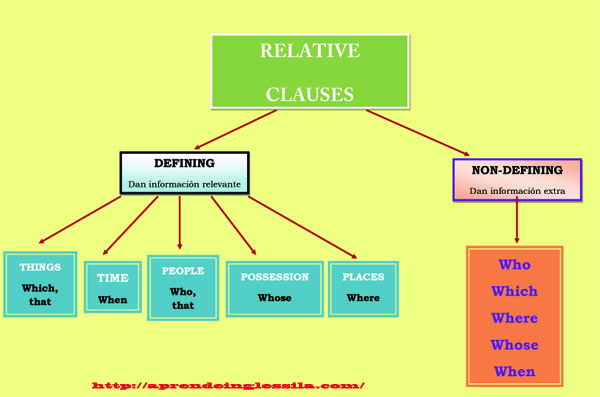https://comoaprenderinglesbien.com/ejercicios-de-relative-clauses/
1. The relative pronouns:
The relative pronouns are:
| Subject | Object | Possessive |
|---|---|---|
| who | whom, who | whose |
| which | which | whose |
| that | that |
We use who and whom for people, and which for things.
We use that for people or things.
We use relative pronouns to introduce relative clauses, which tell us more about people and things.
2. Relative clauses to postmodify a noun
We use relative clauses to postmodify a noun - to make clear which person or thing we are talking about. In these clauses we can have the relative pronoun who, which, whose or that
- as subject (see Clauses Sentences and Phrases)
Isn’t that the woman who lives across the road from you?
The police said the accident that happened last night was unavoidable
The newspaper reported that the tiger which killed its keeper has been put down.
The police said the accident that happened last night was unavoidable
The newspaper reported that the tiger which killed its keeper has been put down.
WARNING:
The relative pronoun is the subject of the clause.
We do not repeat the subject:
The relative pronoun is the subject of the clause.
We do not repeat the subject:
*The woman who [she] lives across the road…
*The tiger which[it] killed its keeper …
*The tiger which
- as object of a clause (see Clauses, Sentences and Phrases)
Have you seen those people who we met on holiday?
You shouldn’t believe everything that you read in the newspaper.
The house that we rented in London was fully furnished.
The food was definitely the thing which I enjoyed most about our holiday.
You shouldn’t believe everything that you read in the newspaper.
The house that we rented in London was fully furnished.
The food was definitely the thing which I enjoyed most about our holiday.
- Sometimes we use whom instead of who when the relative pronoun is the object:
Have you seen those people whom we met on holiday?
- When the relative pronoun is object of its clause we sometimes leave it out:
Have you seen those people we met on holiday?
You shouldn’t believe everything you read in the newspaper.
The house we rented in London was fully furnished.
The food was definitely the thing I enjoyed most about our holiday.
You shouldn’t believe everything you read in the newspaper.
The house we rented in London was fully furnished.
The food was definitely the thing I enjoyed most about our holiday.
WARNING:
The relative pronoun is the object of the clause.
We do not repeat the object:
The relative pronoun is the object of the clause.
We do not repeat the object:
Have you seen those people who we met [them] on holiday?
The house that we rented[it] in London was fully furnished.
The food was definitely the thing I enjoyed[it] most about our holiday.
The house that we rented
The food was definitely the thing I enjoyed
- as object of a preposition. When the relative pronoun is the object of a preposition we usually put the preposition after the verb.:
You were talking to a woman >>> Who was the woman who you were talking to?
My parents live in that house >>> That’s the house that my parents live in.
You were talking about a book. I haven’t read it. >>> I haven’t read the book which you were talking about.
My parents live in that house >>> That’s the house that my parents live in.
You were talking about a book. I haven’t read it. >>> I haven’t read the book which you were talking about.
- When the relative pronoun is the object of a preposition we usually leave it out:
Who was the woman you were talking to?
That’s the house my parents live in.
That’s the house my parents live in.
- Sometimes we use whom instead of who:
Who was that woman whom you were talking about.
- When we use whom, which or whose the preposition sometimes comes at the beginning of the clause:
I haven’t read the book about which you were talking.
- We can use the possessive form, whose, in a relative clause:
I always forget that woman’s name >>> That’s the woman whose name I always forget.
I met a man whose brother works in Moscow.
I met a man whose brother works in Moscow.
3. Times and places
We also use when with times and where with places to make it clear which time or place we are talking about:
England won the world cup in 1996. It was the year when we got married.
I remember my twentieth birthday. It was the day when the tsunami happened.
Do you remember the place where we caught the train?
Stratford-upon-Avon is the town where Shakespeare was born.
I remember my twentieth birthday. It was the day when the tsunami happened.
Do you remember the place where we caught the train?
Stratford-upon-Avon is the town where Shakespeare was born.
... but we can leave out the word when:
England won the world cup in 1996. It was the year we got married.
I remember my twentieth birthday. It was the day the tsunami happened.
I remember my twentieth birthday. It was the day the tsunami happened.
4. Giving additional information
We use who, whom, whose, and which (but not that) in relative clauses to tell us more about a person or thing.
- as subject (see Clauses, Sentences and Phrases)
My uncle, who was born in Hong Kong, lived most of his life overseas.
I have just read Orwell’s 1984, which is one of the most frightening books ever written.
I have just read Orwell’s 1984, which is one of the most frightening books ever written.
WARNING:
The relative pronoun is the subject of the clause.
We do not repeat the subject:
My uncle, who[he] was born in Hong Kong, lived most of his life overseas.
I have just read Orwell’s 1984, which[it] is one of the most frightening books ever written.
The relative pronoun is the subject of the clause.
We do not repeat the subject:
My uncle, who
I have just read Orwell’s 1984, which
- as object (see Clauses, Sentences and Phrases)
We saw the latest Harry Potter film, which we really enjoyed.
My favourite actor is Marlon Brando, who I saw in “On the Waterfront”.
My favourite actor is Marlon Brando, who I saw in “On the Waterfront”.
- we can use whom instead of who as object:
My favourite actor was Marlon Brando, whom I saw in “On the Waterfront”.
WARNING:
The relative pronoun is the object of the clause.
We do not repeat the object:
The relative pronoun is the object of the clause.
We do not repeat the object:
We saw the latest Harry Potter film, which we really enjoyed [it].
My favourite actor is Marlon Brando, who I saw[him] in “On the Waterfront”.
My favourite actor is Marlon Brando, who I saw
- as object of a clause :
He finally met Paul McCartney, whom he had always admired.
We are going back to Venice, which we first visited thirty years ago.
We are going back to Venice, which we first visited thirty years ago.
We can also use who as the object.
He finally met Paul McCartney, who he had always admired.
WARNING:
The relative pronoun is the object of the clause.
We do not repeat the object:
The relative pronoun is the object of the clause.
We do not repeat the object:
He finally met Paul McCartney, whom he had always admired [him].
We are going back to Venice, which we first visited[it] thirty years ago.
We are going back to Venice, which we first visited
- as object of a preposition:
He decided to telephone Mrs. Jackson, who he had read about in the newspaper.
That’s the programme which we listened to last night.
That’s the programme which we listened to last night.
- We sometimes use whom instead of who:
He decided to telephone Mrs. Jackson, whom he had read about in the newspaper.
- The preposition sometimes comes in front of the relative pronoun whom or which:
He decided to telephone Mrs. Jackson, about whom he had read in the newspaper.
That’s the programme to which we listened last night.
That’s the programme to which we listened last night.
5. Quantifiers and numbers with relative pronouns
We often use quantifiers and numbers with relative pronouns:
many of whom - most of whom - one of which - none of whom
some of which - lots of whom - two of which - etc.
some of which - lots of whom - two of which - etc.
We can use them as subject, object or object of a preposition.
She has three brothers, two of whom are in the army.
I read three books last week, one of which I really enjoyed.
There were some good programmes on the radio, none of which I listened to.
I read three books last week, one of which I really enjoyed.
There were some good programmes on the radio, none of which I listened to.
6. Using "which" to give more information
We often use the relative pronoun which to say something about a clause:
He was usually late, which always annoyed his father.
We’ve missed our train, which means we may be late.
We’ve missed our train, which means we may be late.

https://www.aprendeinglessila.com/2014/01/defining-relative-clauses-oraciones-subordinadas-adjetivas-especificativas/
TAKEN FROM=
https://learnenglish.britishcouncil.org/en/english-grammar/relative-clauses
https://www.aprendeinglessila.com/2014/01/defining-relative-clauses-oraciones-subordinadas-adjetivas-especificativas/
https://comoaprenderinglesbien.com/ejercicios-de-relative-clauses/


No hay comentarios.:
Publicar un comentario